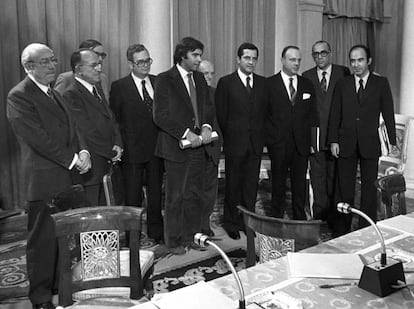1,670 days that changed Spain
Former Prime Minister Adolfo Su¨¢rez built a broad consensus in just a few years It enabled sweeping legal, political, social and economic reforms


He reached power undemocratically, by royal designation, on July 3, 1976. By the time he stepped down on January 29, 1981, after two successful elections and one traumatic resignation, democracy was fully functional. Adolfo Su¨¢rez (1932-2014), the man who guided his country out of the shadows of Franco¡¯s regime and into the light of freedom, built this democracy on the foundations of sweeping legal reforms and great cross-party consensus. They were 1,670 days that changed Spain.
The Political Reform Law was passed when the dictatorship was still a presence in Congress and when the guiding principles of the regime were still (if barely) holding the Francoist state model together. On November 18, 1976, parliament voted in favor of the Political Reform Law by 425 to 59 (with 13 abstentions), after its introduction on the floor 11 months earlier. The piece of legislation that opened the door to democracy in Spain was ratified by a popular referendum a month later, with 80-percent approval and an extremely high turnout of 77 percent.
The new law introduced popular sovereignty, voting rights for all Spaniards aged 21 and over, and two chambers (Congress and the Senate) whose representatives would be elected through universal, free, direct and secret suffrage. A fifth of the representatives would be designated directly by the monarch.
Legalizing political parties. The new political reform legislation also paved the way for bringing illegal parties into the fold of democracy between January and April 1977. ¡°It is not good politics to close your eyes to what¡¯s out there,¡± said Su¨¢rez to justify the decision to make the Spanish Communist Party (PCE) legal. ¡°Not only am I not a Communist, I firmly reject their ideology [...], but I am also a democrat, a sincere democrat. Our nation is mature enough to assimilate its own plurality.¡±
Dissolving Franco¡¯s government. The first democratic elections were held on June 15, 1977. Su¨¢rez¡¯s Union of the Democratic Center (UCD) won with 34 percent of the votes. The Socialist Party came close to 30 percent and the Communists obtained nine percent. Su¨¢rez became the first prime minister of a democratic government, although his party lacked an absolute majority in parliament.
Constitutional Committee. The new representatives had a mandate to draft a constitution granting the Spanish people national sovereignty, cementing the system of devolved powers to the regions, and establishing parliamentary monarchy as the form of government. While the legal text was being debated, the executive pardoned the last remaining political prisoners.
The Moncloa Pacts. While elected officials hammered out a new constitution to guide democratic coexistence, the executive reached across party lines to forge two very relevant agreements with the opposition. The Moncloa Pacts, named after the prime minister¡¯s official residence in Madrid, reflected a broad consensus on economic policy (the right to unionize, limits on wage raises reflecting inflation, devaluation of the peseta and tax reform) and on legal and political issues (including the right of association and freedom of expression). The Pacts were signed on October 25, 1977 by the leaders of all the main parties and the CC OO labor union.
Su¨¢rez had previously discussed the agreements in early conversations with Socialist and Communist leaders Felipe Gonz¨¢lez and Santiago Carrillo, respectively, to ensure a degree of stability given that his own UCD lacked an absolute majority in Congress.
Amnesty Law. Su¨¢rez¡¯s knack for consensus-building also paved the way for a bill presented jointly by UCD, PCE, PSOE and the Basque and Catalan minorities. The bill became law in October 1977 and specifically pardoned:
a) All acts with a political intention, regardless of their outcome, defined as crimes and offenses and committed before December 15, 1976.
b) All acts of the same nature committed between December 15, 1976 and June 15, 1977, when the political intention can be also construed as an attempt at re-establishing liberties or claiming autonomy for the various nations in Spain.
c) All acts of the same nature and goal as the ones contemplated in the previous paragraph, committed until October 6, 1977, as long as there was no serious violence against the life or integrity of individuals.
Marcelino Camacho, a unionist and a deputy for the PCE, said at the time: ¡°We want to open the door to peace and freedom. We want to end one chapter and start a new one. We Communists who have been so badly wounded, and who have suffered so much, have nevertheless buried our dead and our resentments. We are determined to step firmly forward on this road to freedom, on this path of peace and progress.¡±
Municipal elections. While some members of parliament worked on the new constitution, others drafted the legal reforms that would guarantee change. In December 1977, draft legislation for local elections got fast-track treatment in both houses. Mart¨ªn Villa, who was then Interior Minister, defended the law with solemnity. ¡°For freedom to be authentic and operative, it must start precisely at the deepest, most immediate levels. It requires citizen participation and presence in the running of their most immediate common interests, which is precisely what local governments express and represent. In short, citizen self-government is a key element in a political system with effective freedoms.¡±
Adultery decriminalized, birth control made legal and divorce legislation passed. As a result of the Moncloa Pacts, the government sent Congress several legal reforms to ensure adultery and use of birth controls would stop being a crime. Su¨¢rez also left the Divorce Law ready for later approval, which was eventually passed on June 22, 1981.
Tu suscripci¨®n se est¨¢ usando en otro dispositivo
?Quieres a?adir otro usuario a tu suscripci¨®n?
Si contin¨²as leyendo en este dispositivo, no se podr¨¢ leer en el otro.
FlechaTu suscripci¨®n se est¨¢ usando en otro dispositivo y solo puedes acceder a EL PA?S desde un dispositivo a la vez.
Si quieres compartir tu cuenta, cambia tu suscripci¨®n a la modalidad Premium, as¨ª podr¨¢s a?adir otro usuario. Cada uno acceder¨¢ con su propia cuenta de email, lo que os permitir¨¢ personalizar vuestra experiencia en EL PA?S.
?Tienes una suscripci¨®n de empresa? Accede aqu¨ª para contratar m¨¢s cuentas.
En el caso de no saber qui¨¦n est¨¢ usando tu cuenta, te recomendamos cambiar tu contrase?a aqu¨ª.
Si decides continuar compartiendo tu cuenta, este mensaje se mostrar¨¢ en tu dispositivo y en el de la otra persona que est¨¢ usando tu cuenta de forma indefinida, afectando a tu experiencia de lectura. Puedes consultar aqu¨ª los t¨¦rminos y condiciones de la suscripci¨®n digital.








































